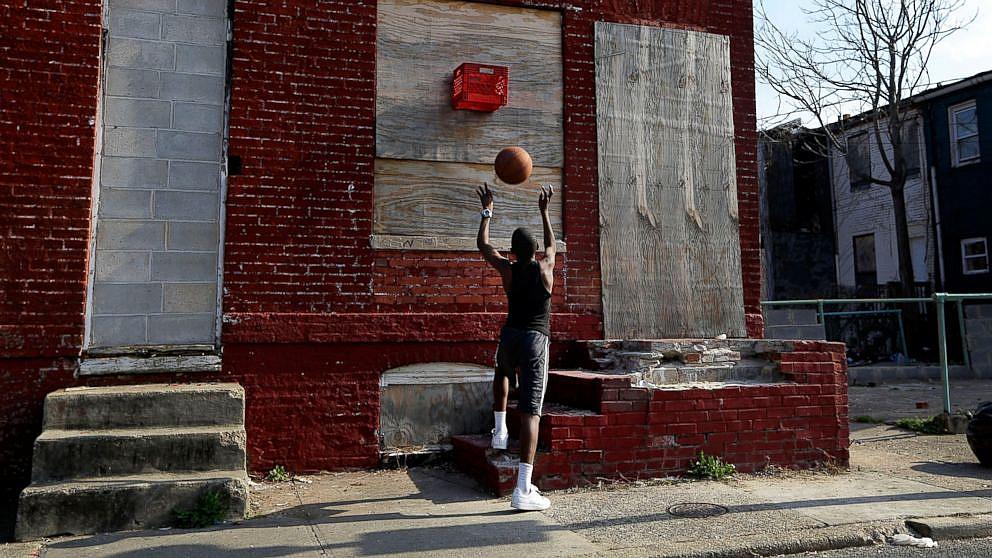HIV Hot Spots a Stark Reminder of Deadly Disease
Researchers enlisted local pharmacies in the Bronx and Manhattan to offer free rapid HIV testing to any interested passerby. The disease thrives, in some of the most impoverished parts of major cities in the United States with many not even knowing they are infected.
Mikaela Conley wrote this story for ABCNews.com as a 2013 National Health Journalism Fellow. Other fellowship stories of hers include:
HIV-Positive Woman Seeks to Reduce Stigma

A boy shoots a basketball into a makeshift basket made from a milk crate and attached to a vacant row house in Baltimore, April 8, 2013. Patrick Semansky/AP Photo
HIV is something that many Americans hear about, maybe learn about, but remain unaffected by. Nevertheless, there continue to be "hot spots" where the disease thrives, and those areas are some of the most impoverished parts of major cities in the United States, including Baltimore, Atlanta, Washington, D.C., Newark and New York City.
Researchers at the Albert Einstein School of Medicine are trying to get to the heart of those areas. By enlisting certain local pharmacies in the Bronx and Manhattan, pharmacists and researchers have been able to offer free rapid HIV testing to any interested passerby.
One of the Walgreens pharmacies included in the study is right near the Pelham Parkway subway stop in the Bronx. Mothers push babies in strollers; men stand outside the Bargain Store smoking and laughing, a homeless man whizzes by on a motorized scooter and customers carry grocery bags out of Ganzo's Food Mart across the street.
At the pharmacy, researchers stood outside at a table, offering free rapid HIV screenings to passersby.
Clients who agreed to take the test were escorted to a private space within the pharmacy. Their mouths were then swabbed, and during the 20 minutes it took to receive the rapid HIV test results, clients were asked to fill out a risk-factor questionnaire. If clients received a positive oral test, they were offered immediate care at an HIV clinic. If clients tested negative on the oral test, they were given risk-reduction information and condoms.
"There is currently this traditional model of testing where people are supposed to wait and get tested in a medical setting," said Dr. Jason Leider, associate professor of clinical medicine at Albert Einstein School of Medicine and co-investigator of the study, published in the journal AIDS Patient Care and STDs. "Rather than wait, we decided to bring access to them, the public."
The study lasted a little over nine months. In that time, more than 2,000 people were tested, and six people received positive HIV diagnoses in that time.
According to the Centers for Disease Control and Prevention, there are more than 780,000 people in the U.S. have HIV/AIDS, and nearly one in five HIV-positive people are unknowingly living with the virus. And with 1.2 million people in the Bronx, about 25,000 are currently living with HIV, said Leider. A lot of those people who carry a positive diagnosis do not have proper access to testing or follow-up care, leading to greater transmission of the disease and much sicker patients when they actually do go to see a doctor about symptoms.
"Rapid tests are certainly an important area to keep in the arsenal for HIV testing," said Josh Robbins, an HIV-positive Nashville resident who advocates for HIV education in hopes of reducing stigma. "The peer-to-peer counseling available during these testing sessions is so valuable. The fact that we are allowing these type of conversations to happen is so important."
Dr. Carlos Del Rio of Emory University is a leading researcher of HIV in the United States. He said it's simply "not acceptable" to have the rate of new HIV infections in this country -- holding steady at about 50,000 per year, the highest rate out of any developed country in the world.
"This epidemic in the U.S. is the face of the forgotten people," said Del Rio, who added that most HIV-positive people are low-income with little education and access to care. "The disease is alive and well in certain areas, and community-based organizations are going to be key in bridging the gap in care."
The researchers chose five different community pharmacies in hot spot areas that have heavy foot traffic. Public Health Advocates, or PHAs, were trained to approach people in the pharmacies and on the sidewalks to offer HIV testing. When an individual agreed to getting tested, the PHA would administer the rapid HIV test, which consisted of a simple swab of saliva, which provided initial results in 20 minutes.
If and when people received a positive diagnosis at the pharmacy, the PHAs offered to immediately bring the patient to a local HIV clinic, bridging the gap in an initial diagnosis and preliminary HIV treatment and care.
Study authors said the results of participation show that local pharmacies in HIV hot spots not only may help in getting more people tested, but may also be able to bridge the gap in care once a diagnosis is received. They also hope to destigmatize HIV testing as much as possible by bundling the test with other screenings (like Hepatitis C) and eventually make the test as accessible as getting a flu shot.
"We really want to reduce stigma and make it less scary than just getting tested for HIV alone," said Dr. Yvette Calderon, professor of clinical emergency medicine at Albert Einstein College of Medicine and lead author of the study.
The researchers are currently conducting another similar study with a new cohort of patients.
"Imagine this kind of grassroots things about any sort of health issue, where people can learn to empower themselves and be their own advocate," said Sabrina Heard, an HIV community outreach worker with the Women's Collective. "That, combined with compassion, is going to be what makes a difference."
This story was originally published on ABCNews.
Photo Credit: Patrick Semansky/AP Photo

